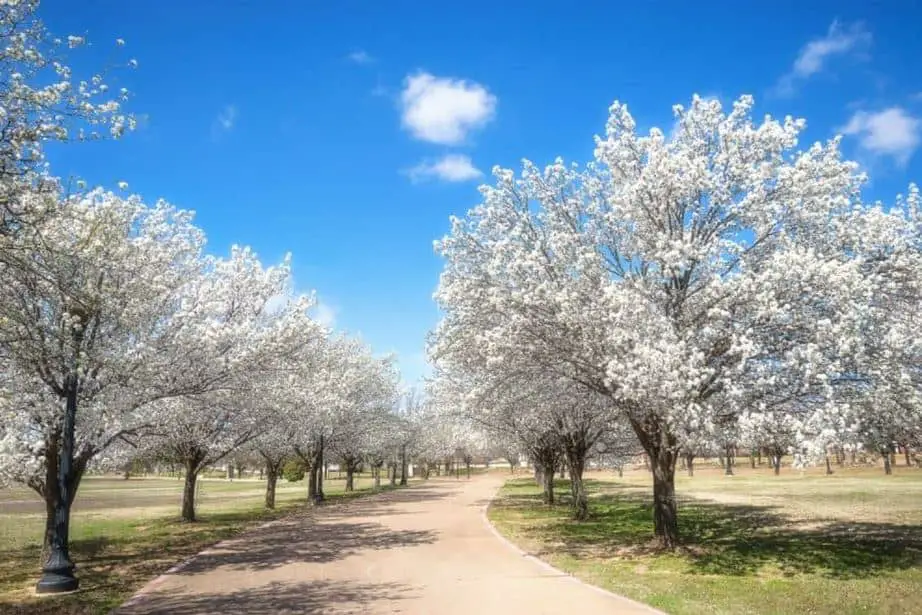The news, you say? In Ohio, Bradford pear trees are no longer allowed. As on January 1st, 2023, residents in this state are no longer permitted to buy, sell, or grow these ornamental trees. With their restrictions on Bradford pear trees, several states are following suit. Which state will be the next?

Problems with Bradford Pear Trees
Early in the 20th century, Bradford pears (Pyrus calleryana), native to Asia, were introduced to the United States and immediately became well-liked as ornamentals. The fact that these quickly growing trees were vulnerable to breaking in wind, ice, and rainstorms was not well understood then. Annual trimming to maintain the canopy sturdy became necessary to stop this from occurring.
Additionally, most of these trees have a lifetime of fewer than 25 years, and they usually become fairly tall. However, a common issue with Bradford pear trees was quickly identified by many homeowners.
Bradford’s pears bloom profusely with lovely white flowers every spring. The blossoms generated what people started to call the Bradford pear tree fragrance, although they are regarded as stunning landscape examples. Bradford pears have a foul odor best characterized as “fishy” in blossom.
Are Bradford pears a noxious species?
It takes more than a stench to have a tree outlawed. Bradford pear trees, formerly believed to be a sterile variety of the Callery pear species, are now considered invasive. Although the blossoms cannot pollinate themselves, Bradford pear trees may cross-pollinate with other Pyrus calleryana varieties and produce healthy seeds.
Numerous birds and tiny animals eat the fruit, which is thought to be inedible by human standards. The seeds are subsequently spread to other locations. In contrast to the Bradford pear cultivar, multiplied via cloning, the offspring trees that emerge from cross-pollinated seeds have huge thorns that harm cattle and destroy machinery.
The progeny of Bradford pear trees, called Callery pears, are durable and adapt well to various habitats. Callery trees have taken over open fields, highway medians, and woodlands.
As a result, native species are pushed out, and the progeny of the invasive Bradford pear doesn’t provide much food for insects. As a result, fewer caterpillars are available for birds to use as food for their young. As it climbs the food chain, this produces a snowball effect that reduces biodiversity.
Banning Bradford Pear Trees
One strategy for limiting the spread of Bradford pear trees into the wild is to outlaw their sale, propagation, and planting. It took Ohio five years to enact the legislation in 2018. Why the wait?
For landscapers, growers, and nursery operators, the sale of Bradford pear trees was economically significant, in contrast to other invasive plants like the Canada thistle and multiflora rose. Giving these Ohio companies a five-year opportunity to cut down on and gradually phase out their stock of these trees helps shield the sector from financial difficulty.
Following Ohio’s example, South Carolina and Pennsylvania passed laws that, beginning in February and October of 2024, respectively, will outlaw the sale of these trees in the future. Will other states adopt this policy?
A consumer education campaign has already been launched in Indiana. The goal is to decrease customer demand for Callery pears and persuade nurseries to promote more ecologically friendly options by drawing attention to the harm these pears do to the environment. These consist of the following:
- American Hornbeam
- American Plum
- Blackgum
- Cherry
- Chokecherry
- Eastern Redbud
- Flowering Dogwood
- Hawthorn
- Serviceberry
- Yellowwood
Existing Bradford trees are grandfathered in for Ohio residents, so removing them from their land is unnecessary. However, groups in Ohio and other states are giving free replacement trees as incentives to take down Bradford pear trees.
It is essential to contact your neighborhood extension office for the most recent details about Bradford Pear Bounty initiatives. The news has gotten out regarding the many issues with Bradford pear trees. Due to the strong public support in certain locations, bounty schemes had to be discontinued.


